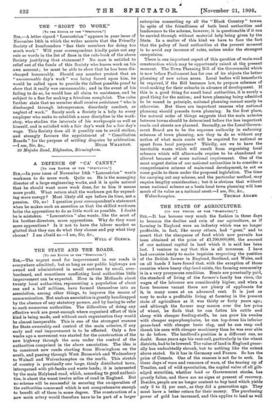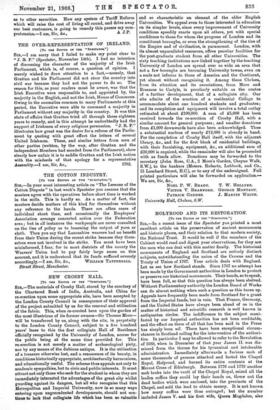THE STATE OF AGRICULTURE.
[TO TOR EDITOR OF TUX "SPROVITOII:1
STE,—It has become very much the fashion in these days to bemoan the decline and ruin of our agriculture, as if farming in England were an industry which was no longer profitable, in fact, like many others, had "gone," and to assert that the cheapness of food which now prevails had been obtained at the price of 21,700,000,000, the amount of our national capital in land which it is said has been lost. I venture to say that this is all nonsense. I have had occasion lately to make inquiries • respecting the position of the British farmer in England, Scotland, and Wales, and on all bands I have found that, with the exception of those counties where heavy clay-land exists, the farming community is in a very prosperous condition. Rents are punctually paid, the standard of living of the farmer's family has risen, the wages of the labourer are considerably higher, and when a farm becomes vacant there are plenty of applicants for it, in many cases at an advanced rent. It is just as easy to make a profitable living at farming in the present state of agriculture as it was thirty or forty years ago; and although the farmer may mourn over the low price of wheat, he finds that he can fatten his cattle and sheep. with cheaper feeding-stuffs, he can grow his swedes with cheaper superphosphates, he can top-dress his inferior grass-land with cheaper basic slag, and he can reap and thresh his corn with cheaper machinery than he was ever able to do before. The landlord's position is a different one, no doubt. Some years ago his rent-roll, particularly in the wheat districts, bad to be lowered. The value of land in England gener- ally has undoubtedly shrunk, but to nothing like the extent above stated. So it has in Germany and France. So has the price of Consols. One of the reasons is not far to seek. In these days of wars and rumours of wars, of the tearing up of Treaties, and of wild speoulation, the capital value of all gilt- edged securities, whether land or Government stocks, has greatly fallen, and there are no signs at present of recovery. Besides, people are no longer content to buy land which yields only '2 to 2i per cent., as they did a generation ago. They must have a better return for their money. The purchasing power of gold has increased, and this applies to land as welt
as to other securities. How any system of Tariff Reform which will raise the cost of living all round, and drive away our best customers, is going to remedy this passes my com-

































































 Previous page
Previous page